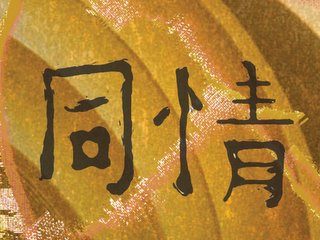
It is Jeremiah’s task to tell the people about the consequences of their actions.
A young man, scholarly and of a gentle nature, Jeremiah refuses God’s appointment as a prophet and begs God to have mercy on His people. It is this quality of compassion that has come to identify Jeremiah as the “weeping prophet” and that depicts the great irony of his life – for he is desperate for personal and national peace, but doomed to a life announcing terror and judgement.
The Chinese character for compassion is our second symbol for today, and will contine to serve as a symbol for Jeremiah himself throughout the remainder of the series. It was that compassion that funded Jeremiah throughout the reforms of Josiah, the boy king of Judah who led the nation in a reorientation towards God.
When Josiah was placed on the throne of Judah at the age of eight by the "People of the Land", the international situation was in flux: to the east, the Assyrian Empire was in the beginning stages of its eventual disintegration, the Babylonian Empire had not yet risen to replace it, and Egypt to the west was still recovering from Assyrian rule. This favored the resurgence of the prowess of Jerusalem, which Josiah expressed in the 8th year of rule by his sincere championing of the God of Israel's cause. He had the foreign cultic objects of Baal, Ashterah or Asherah), "and all the hosts of the heavens" in Solomon's Temple destroyed, the living pagan priests dismissed from their posts and the bones of the priests exhumed from their graves and burned on their altars -- an extreme act of desecration against these pagan deities. (2 Kings 23:4, et seq.)
In 18th year of King Josiah, he again worked on behalf of Yahweh by having the High Priest Hilkiah take the taxes that had been collected over the years, and use them to repair the neglect and damage the Temple had suffered during the reigns of Amon and Manasseh. While Hilkiah was clearing the treasure room of the Temple (2 Chr. 34:14), he is said to have found a scroll described as "the book, book of the Torah. Hilkiah brought this scroll to Josiah's attention, and the king had it read to a crowd in Jerusalem.
In that same 18th year, Josiah celebrated a Passover which hadn’t been done "since the days of the Judges" (2 Kings 23:22). At some point between this year and his death, Josiah reasserted Judean control in the former territories of the kingdom of Israel, which is recorded in 2 Kings as systematically destroying the cultic objects, as well as executing the priests of the pagan gods. The only exception he made was for the grave of an unnamed prophet he found in Bethel, who had foretold that these religious sites Jeroboam erected would one day be destroyed (23:15-19).
It was during this time of reform, which was accompanied by significant death and destruction, that Jeremiah’s complexity as a biblical character was revealed. One the one hand Jeremiah is enthused about the reforms and begins to experience some hope for his people; but, on the other hand, he is still broken-hearted about the pain and suffering that his own people must endure because of their wayward condition.
So great was Jeremiah’s heartfelt compassion for the people that he compared himself at one point to a rabbi in a Jewish fable. In the fable, the high priest was about to perform in the temple the ceremonies prescribed in the case of a woman suspected of adultery [Numbers v.12 et seq.], and who, when he approached her with the “cup of the bitter water,” beheld his own mother.





No comments:
Post a Comment